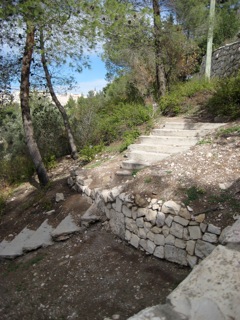The Healing Power of Taking Stock
September, 2011 (Slightly edited 4.2014)
We’ve arrived at the last days of summer.
If you’re new to Focusing, perhaps you have questions about what Focusing might be able to offer you; If you’re already a Focuser, perhaps you have questions about how to best use Focusing for a particular issue in your life. Or maybe you’re like so many of us who don’t know exactly what question you’d like to ask, but you do know that there is one there, somewhere, wanting to come to light.
I welcome all of these! Simply click here to open an email window that is already addressed to me and let me know your thoughts, questions, whatever you might wish to share.
Meanwhile, I’ll continue with a theme started in prior articles- writing a bit about a subject or issue that is relevant for most of us, and then discussing how the subject might be highlighted in the current month, according to a kabbalistic or other traditional understanding of the Jewish calendar.
The healing power of “taking stock”
First, what does it mean to take stock, or to do an inner accounting? This refers to taking time and energy to look at our lives. When done at the end of a year, to look back at the year.
Maybe comparing what we’d hoped to have accomplished with what we actually accomplished. Noticing where we may not have met our expectations- and where we’ve exceeded our expectations. And giving some thought to goals and intentions for the year to come.
In Judaism, it is traditional to devote time during the last month of the year before Rosh Hashana, the Jewish New Year, to do what is called a Heshbon haNefesh, or spiritual accounting.
Many, or even most of us feel some resistance to the idea of taking such an inner accounting. We might claim we have no time for this, and even feel some trepidation about what we might discover in through this process.
Gene Gendlin, the originator of Focusing, has said:
What is true is already so. Owning up to it doesn’t make it any worse.
Not being open about it doesn’t make it go away….
People can stand what is true for they are already enduring it.
What a powerful statement: “What is true is already so.” This seems obvious. And yet, how often we attempt to push away aspects of ourselves we find unpleasant, or deem to be socially unacceptable; or memories that feel scary, or somehow threaten to overwhelm what might feel like the tenuous equilibrium that we’ve managed to find for ourselves.
Gendlin’s last sentence bears repeating: “People can stand what is true, for they are already enduring it.” So often we feel as though we can tuck undesirable thoughts and/or memories into the back corners of our consciousness- and actually believe that if we’re lucky, they may even disappear.
As most of us know, whatever we tuck away never really disappears. It may not be apparent to our conscious awareness, but it is there nevertheless, affecting us in ways we might never realize are connected with that long-ago event.
In noted contrast to how we feel when we resist doing something is how it feels to actually do whatever it was that we’d been resisting. Most of us find simply facing that which we’d previously resisted, to be both empowering and liberating.
Using Focusing to deepen and expand your own Inner Accounting
Focusing can turn what might otherwise be a simple exercise in remembering into sensing and accessing an inner knowing of the inherent, more multidimensional aspects of our being. We become aware of emotional and spiritual dimensions, as well as simply remembering observable facts.
As Ralph Waldo Emerson eloquently affirmed:
What lies behind us and what lies before us are tiny matters compared to what lies within us.
Here are a few questions that you might wish to ask yourself as a way to begin your own inner accounting:
Who am I? i.e. Who is the core me? What makes me unique?
In what way did I grow in the past year? Not necessarily what did I do, but how did I grow?
What do I feel I need or want to accomplish before the end of the year?
Focusing can help you to approach these questions at a level deeper than your conscious mind. The process facilitates your ability to access a deeper, subconscious level of knowing.
Ready to learn how to access your own rich inner knowing? The first step is to schedule a one-one session with me in order to get a feel for how Focusing works, so that when you start classes, you’ll get much more out of them.
For more information about classes, please see the schedule and choose an option that works for you. Then just drop me an email and I’ll send you the information necessary to sign you up. Don’t see something that fits for you? Just let me know and we’ll see what we can work out for you.
If you’re new to Focusing, you can learn more about the process here. For those who’ve completed Level One and are ready to deepen your learning of how to connect more fully with your own inner self, as well as to begin to facilitate the process for others, you can learn more about advanced classes here.
Deepening our understanding of “taking stock” through the Jewish Calendar
The Jewish Calendar, based on both the solar and lunar calendars, is rich with symbolism. According to a well respected Kabbalistic source, The Book of Formation (in Hebrew, Sefer Yetzirah,) each month of the Hebrew year has a sense and a number of other characteristics associated with it.
We are currently in the month of Elul. The month is also sometimes referred to as the the month of mercy, or compassion, and the month of forgiveness. The sense associated with this month is action.
The attitudes of compassion and forgiveness, combined with action, are key ingredients in the work that I do with Focusing. It is so important for us to be gentle with ourselves in order for our inner beings to feel safe enough to open up and to share the precious wisdom held within.
Once we become aware of our inner wisdom, action is required to carry it forward into our lives, and to the world outside.
Jewish tradition puts these together, recognizing that action is limited unless it is accompanied by mercy, compassion, and forgiveness. With these working in tandem, we are able to listen more deeply to ourselves, and to each other, and to begin to effect change in the world.
May you be blessed with the courage and commitment to approach your own inner self with compassion and forgiveness, so that you might then be able to move forward in your life in the way that is right for you.
A few more quotes for the season:
On looking within
Suffice it to say that whenever you want to improve anything in your life, there’s only one place to look: inside you. When you look, do it with love.
Albert Einstein
 Your vision will become clear only when you look into your heart.
Your vision will become clear only when you look into your heart.
Who looks outside dreams. Who looks inside awakens.
Carl Jung
On forgiving
Forgiveness is a funny thing. It warms the heart, and cools the sting.
William Arthur Ward
Forgiveness does not change the past, but it does enlarge the future.
Paul Boese
Forgive all who have offended you. Not for them, but for yourself.
Harriet Nelson
Without forgiveness, life is governed by… an endless cycle of resentment and retaliation.
Robert Assagioli
Forgiveness is the attribute of the strong.
Mahatma Ghandi
About the photos
Both photos were taken by the author along exploratory walks. The steps are in Yemin Moshe, Jerusalem, on the way to the Old City.
The farmhouse and green meadow is alongside a country road in Williamsberg, Massachusetts.

